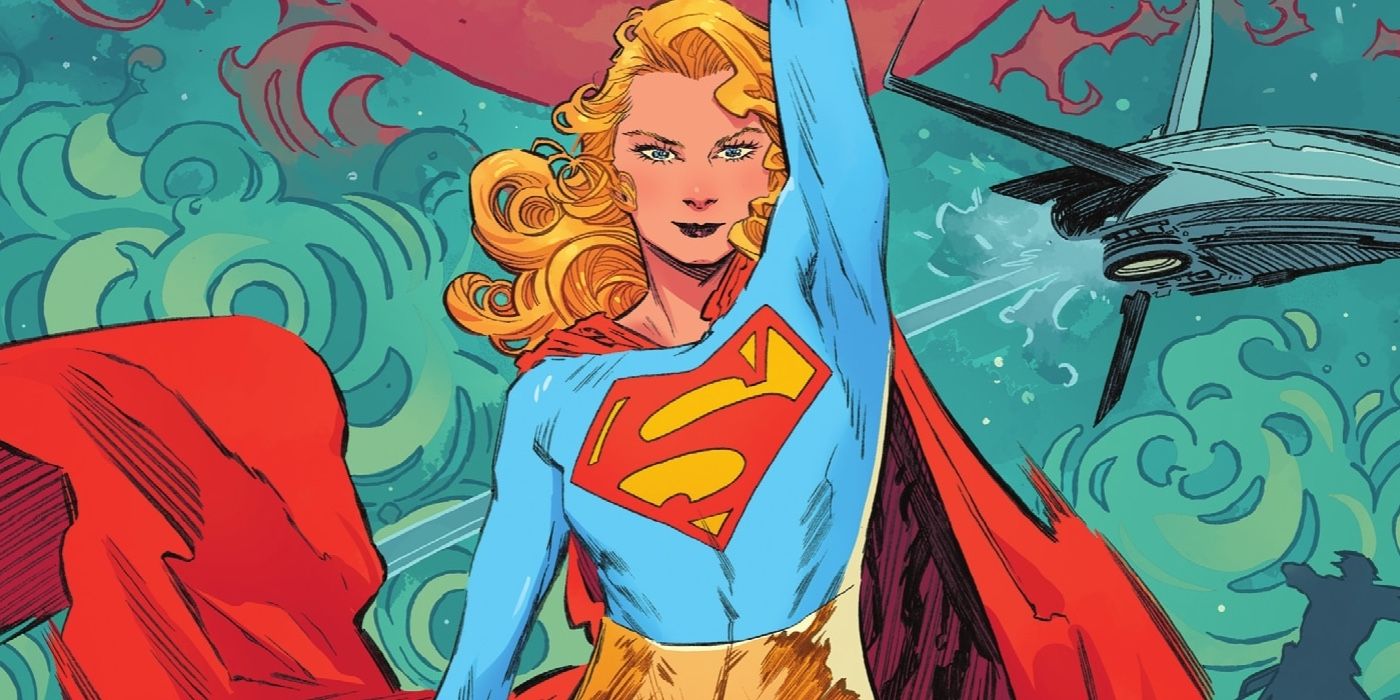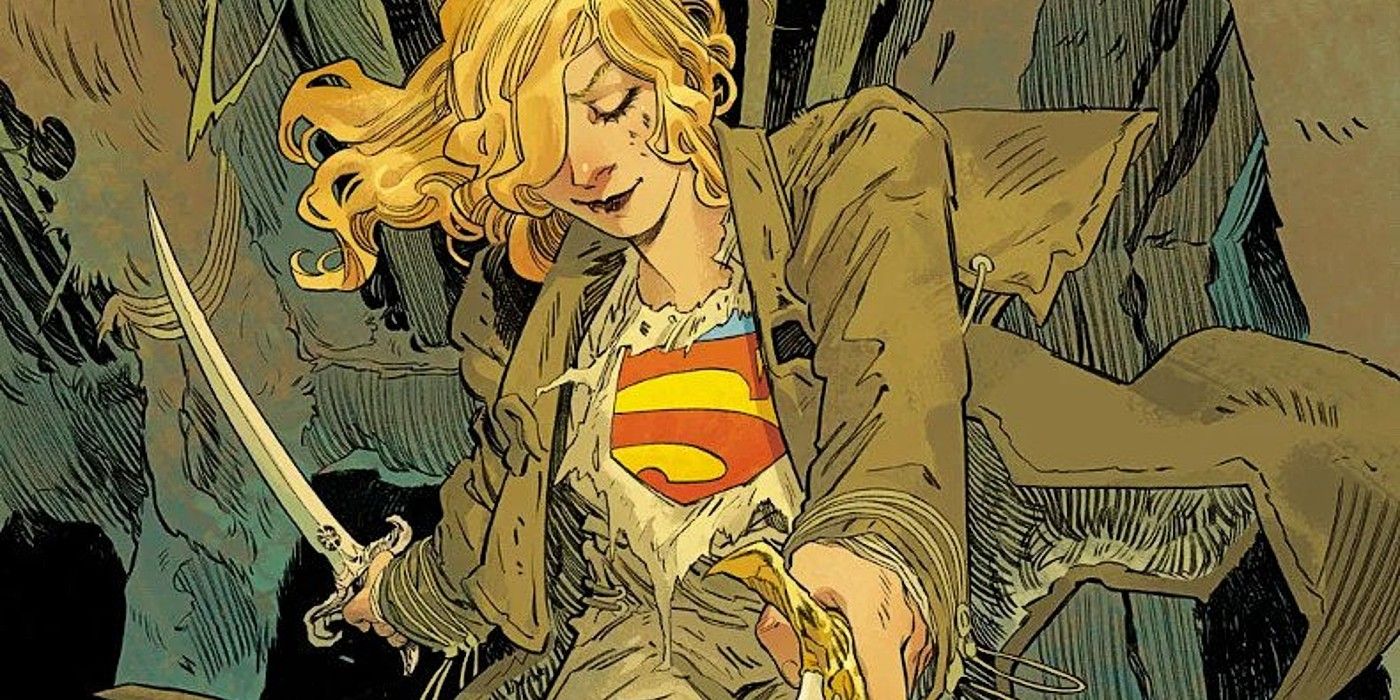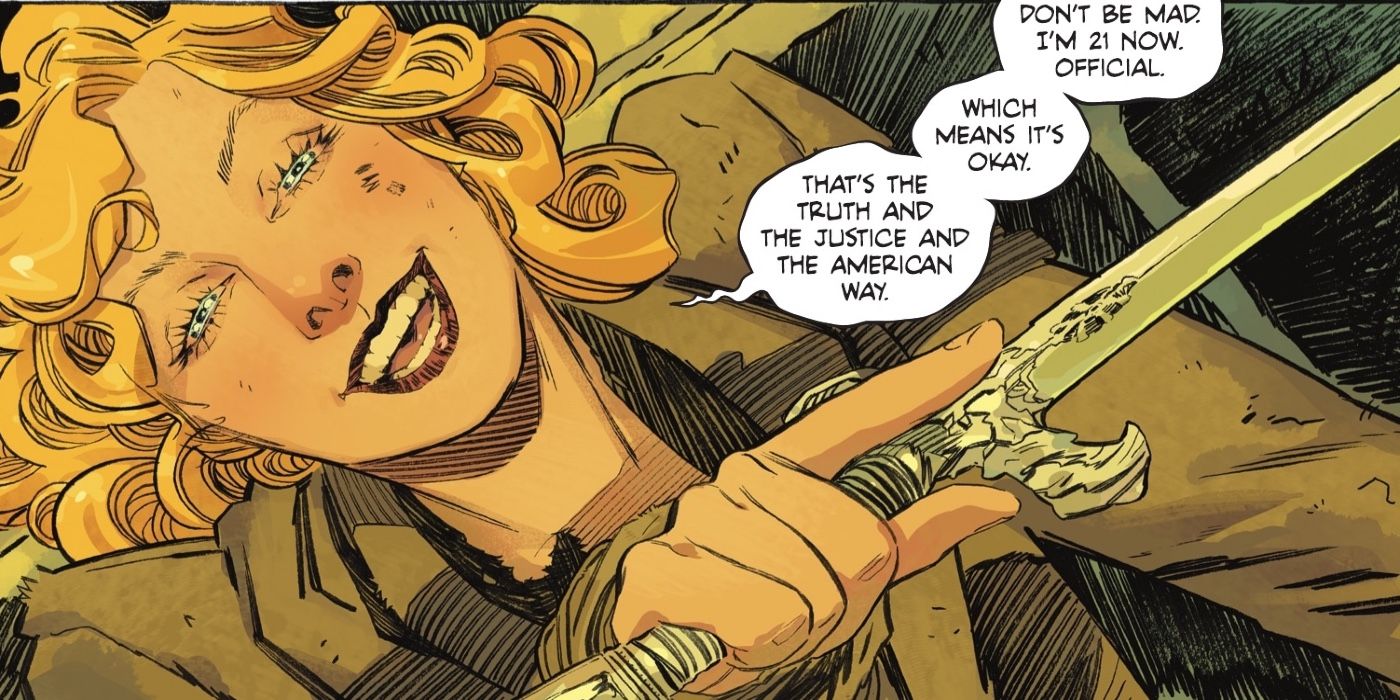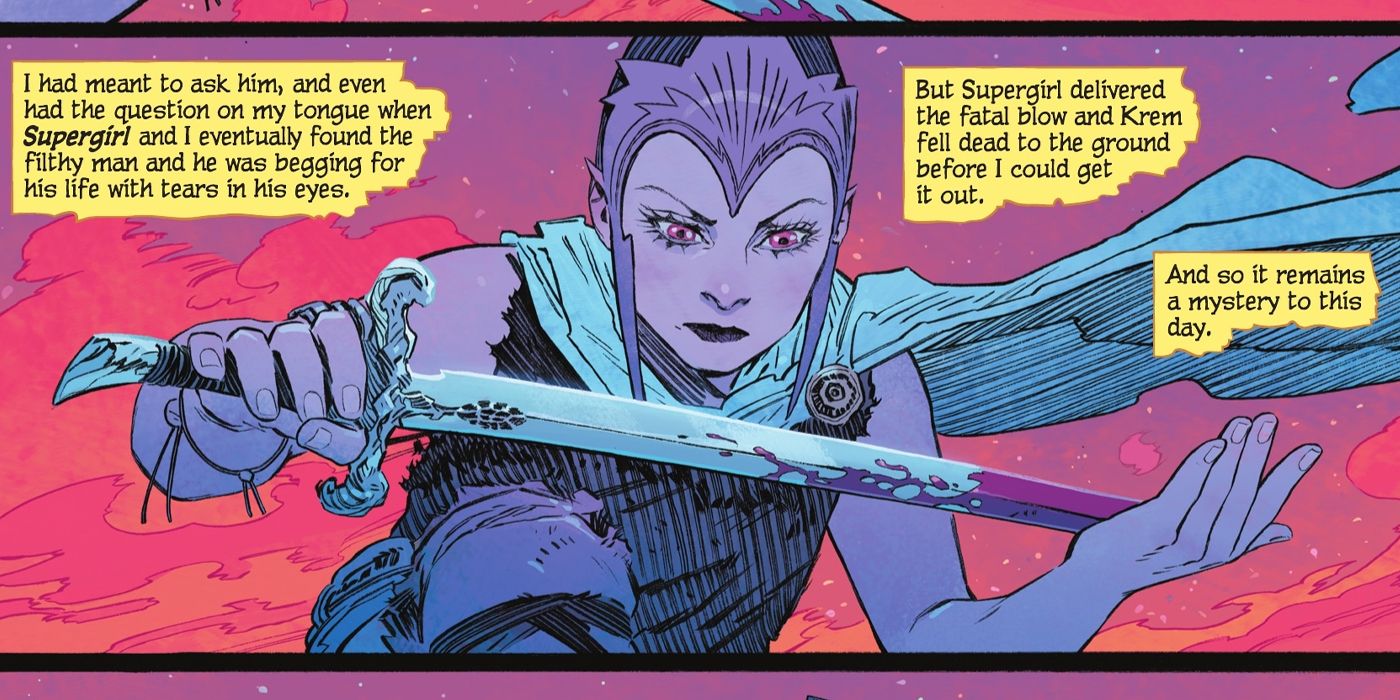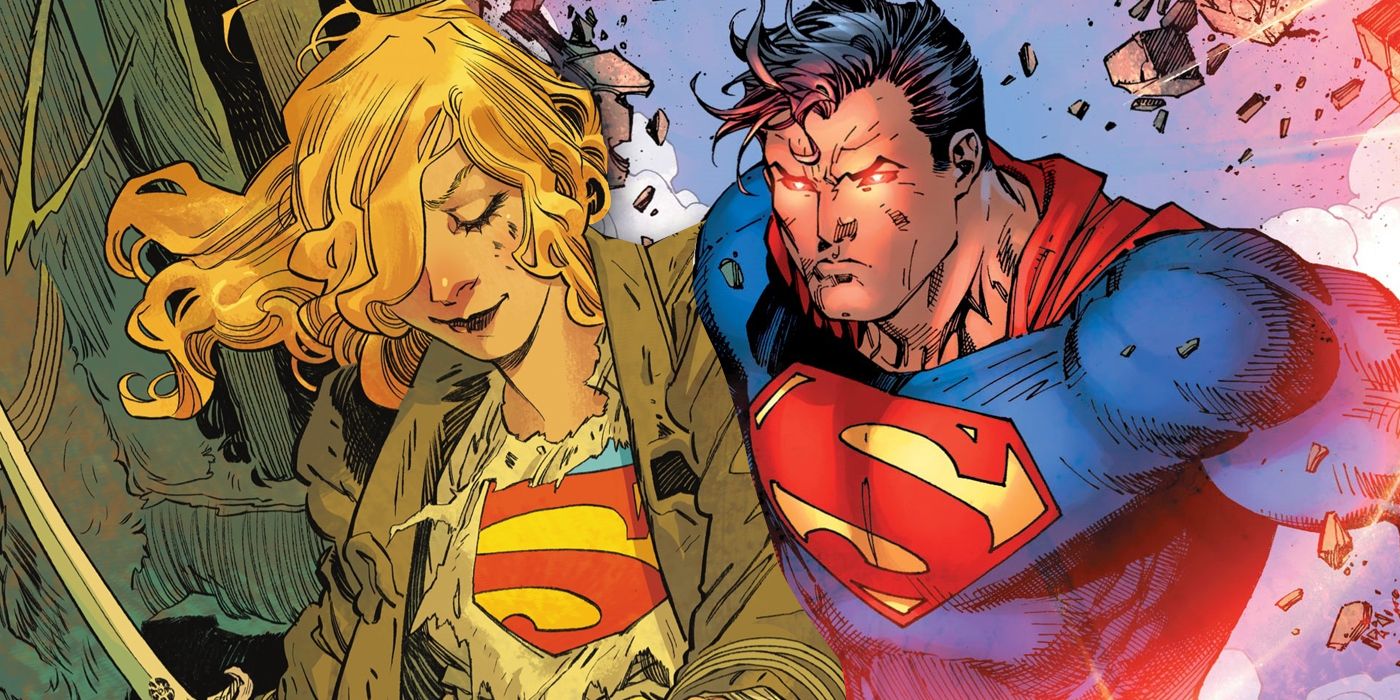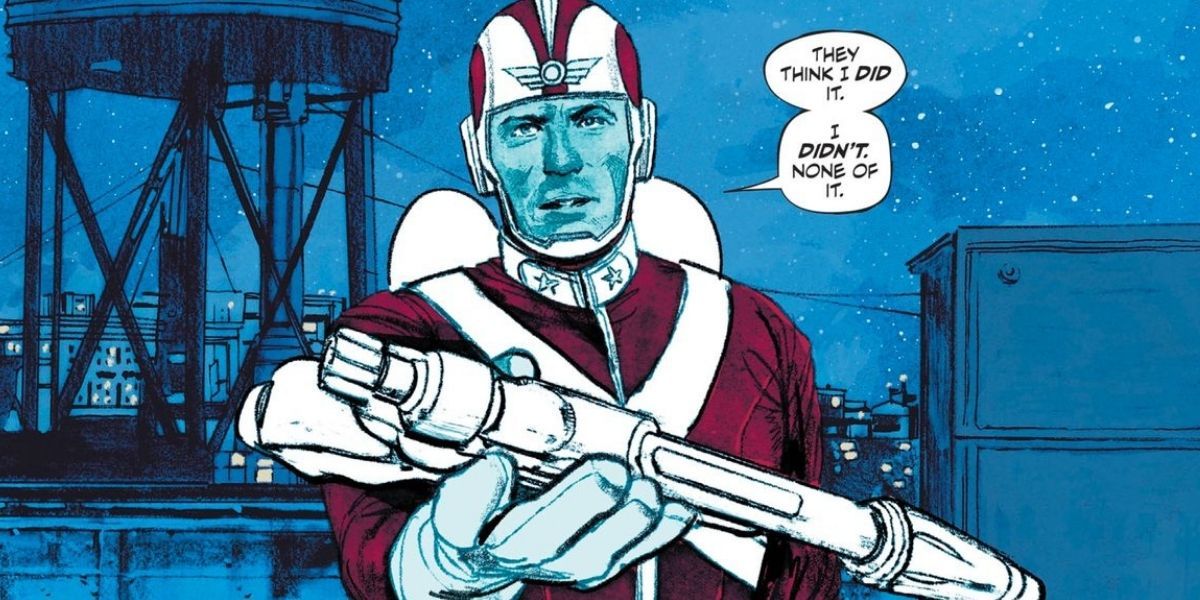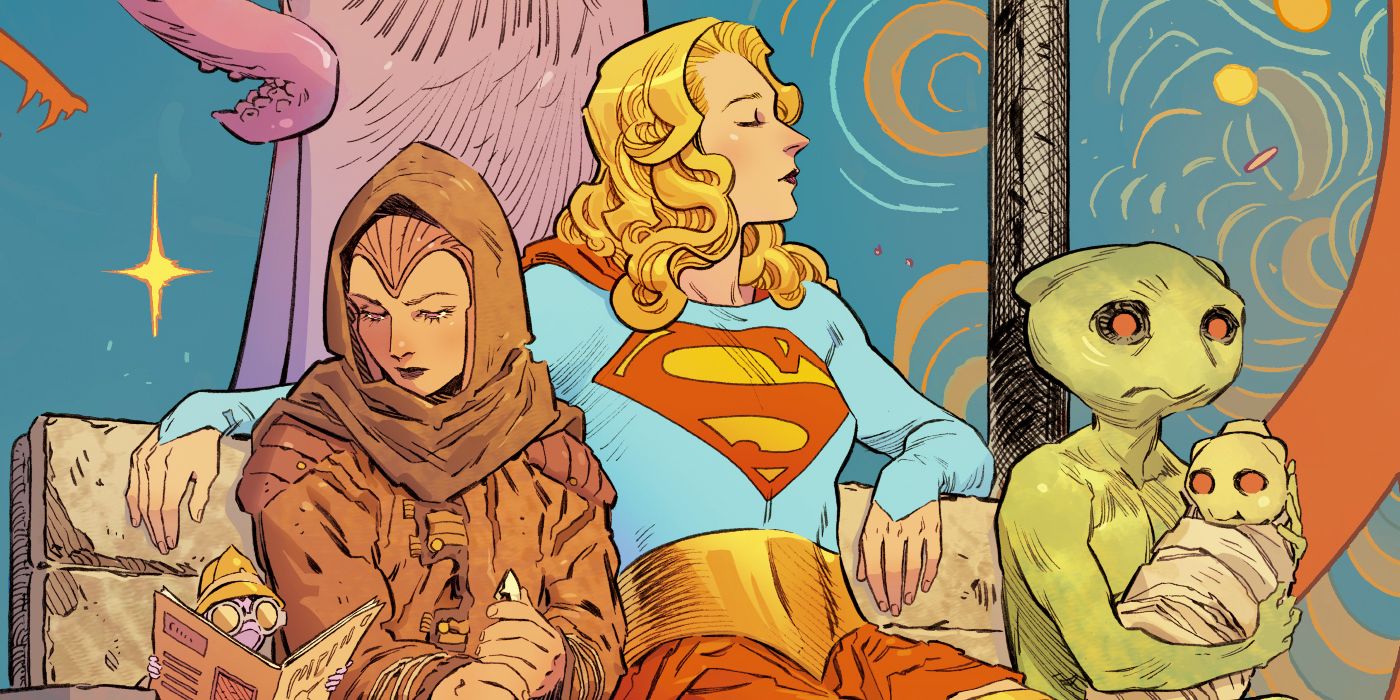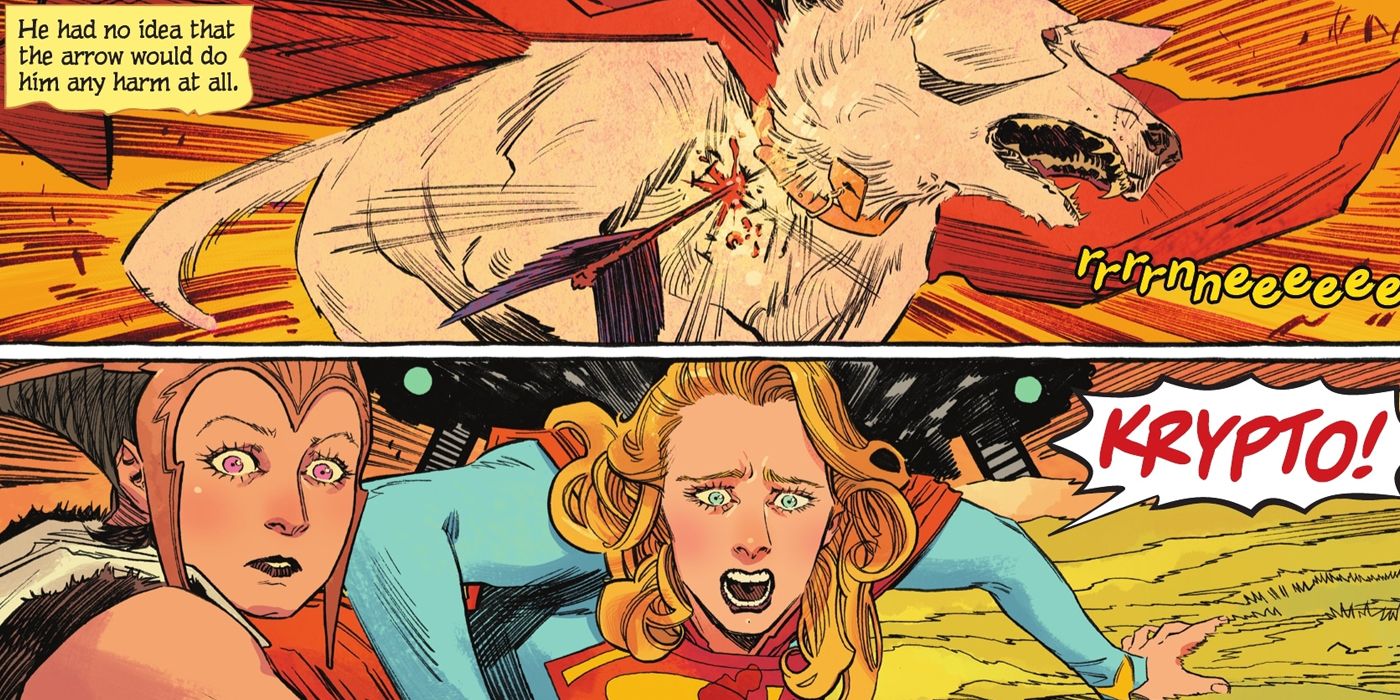Supergirl: Woman of Tomorrow has arrived in comic book shops this week, as Tom King, Bilquis Evely, and Mat Lopez's new DC Comics miniseries takes the character in an all-new, different direction. The gorgeous debut issue features Supergirl celebrating her 21st birthday on a distant planet and ultimately being drawn into a conflict, where she encounters a brave young woman named Ruthye, who needs help in getting revenge for the bastard who killed her father.
We spoke to writer Tom King about tackling a Supergirl miniseries, what it was working alongside such talented creators in Evely and Lopez, and what he hopes readers get from the new tale.
This is a very different Supergirl story, and I think people are going to be surprised with the direction it takes. Were you looking to recreate some of the lo-fi energy of the original Adventure Comics?
Tom King: I think there's a difference when you work with Batman characters and when you work with Super characters. With Batman characters, there's a deconstruction element to them. You want to tear them apart and see what makes them work, and show how those things have ironies and depth and grayness, and then you put them back together. And it's always been a great formula for making good, deep Batman stories.
I think with characters like Supergirl and Superman, you're not looking to deconstruct these characters; you're looking to take off all the armor that everyone else has put on until you get to the core of them. It's about taking them apart and putting them back together. It's like they've got varnishes all over them, and you've got to get them off. So, the idea of this thing was to strip her story down, because Supergirl has a majorly weird history in terms of continuity. At least 13 writers have rewritten her origin over the years. Her dad has 13 origin stories; sometimes he's evil, sometimes he's a robot, sometimes alive, sometimes he's dead.
She's changed dramatically in the last 10 years, between coming back to life to the New 52 to Rebirth. She's gone through so much that it's hard to get a hold of her. Not to mention in the '90s, when I was coming up, she was like an ectoplasmic space angel. There's so much there, and I just wanted to take all that stuff off and get to the core of the character; get her out of her normal environments and her normal conflicts. It seems like all our stories are about her dad or her relationship to Superman. Instead, let's see the purity of that character.
Going back to Otto Binder, and him basing this character on his daughter. How do we get back to what makes her cool? The idea of a woman who, unlike Superman, didn't just survive a Holocaust; she witnessed the Holocaust. She was 14 when she saw her planet, all of her friends die, and her parents die. I wanted to get back to her original self. So, this is a stripping down of Supergirl - but I think it's just a pure version of her. I don't think it's a different version.
We find Supergirl in an interesting state when she's introduced in the story. Did you intentionally make that introduction fun to lighten the heaviness of the story?
Tom King: I think Supergirl is one of those series that's very easy to write in a precious manner, where you worship her more than you write her. And I think that doesn't serve the character or the audience as well as it could. I think showing her travails makes her more human, and shows that what she's overcome requires great strength.
So, I wanted to start out with a very human moment of a person turning 21 and getting drunk. And a person who is getting drunk because they want to be alone, and they just want to forget about the shit that's happened in their past. That's such a human moment. And the fact that she's Supergirl, so she waits till it's legal - because these super people, they follow the rules. She waited, and now it's legal and she can have this moment. She goes off by herself, with her dog that always follows her, and she has a moment where she can be free.
For a lot of people in the US, whether you've been drinking since you were 14 or started that day, your 21st birthday and the day after are days you remember for the rest of your life. It's a day of freedom and consequence, and I wanted to show Supergirl going through that.
Supergirl definitely has a huge audience but hasn't seen prolonged success in the comics as you might expect. Why do you think that is?
Tom King: Well, Supergirl is more mysterious than the others. I mean, you go to a person on the street and tell them about Kyle Rayner or Mister Miracle, they'll give you some blank look. Even if you tell them about Nightwing, which I wrote, they'll be like, "I don't know who that is."
But if you say Supergirl, they're like, "Yeah, of course. I know who Supergirl is. I've known since I was a little baby. My kids all have T-shirts of Supergirl. She's the favorite hero of my cousin." Like, she's someone who lives in our Jungian shared unconscious. Supergirl exists in a way that Mister Miracle does not. There's a universal appeal to her, where she should be one of the big pillars of the DC universe - and it's kind of a mystery of why she isn't. As opposed to Mister Miracle or Vision, where it's not a mystery why they aren't central characters in their universes.
How do you rise to the challenge of helping this character perform as she should?
Tom King: When I first got on this book, I called Steve Orlando, who had just written a Supergirl run. And he was the one who opened my eyes to how good the character is. He had such insight into her. He was like, "There is a difference between Clark and her, and what she's gone through." He just laid it for me.
Some amazing writers have worked on it, but I do think all of them get caught in the same web we were talking about earlier. There's so much fog around this character. And the TV can be a good thing, where people are like, "Yeah, it's a TV show!" But it can also be a bad thing, where people who watch a TV show pick up a Supergirl issue, and they're not seeing Martian Manhunter. And your instinct as a writer is like, "Let's bring in some part of the TV continuity," and then you've got a 15th continuity in there. And then it starts to get more and more muddled.
The idea was to try to get away from that muddle, and to get back to purity and get back to just kickass comic book storytelling. I'm not as good a writer, but I modeled it after what Frank Miller did with Batman: Year One. Batman has all these villains, but if you strip all that away, this is a guy wearing a stupid suit and trying to figure out how to fight crime. And that's what made that great: simple, straight ahead art, and an awesome story. He made a story for all time, so I'll just try to copy that and see if I can do it.
How did you get hooked up with Bilquis Evely on this book?
Tom King: That was the easiest “yes” I ever said. It was more of a celebration than a yes. My editor sent me an email and said, "How about Bilquis?" And I couldn't respond fast enough. I was like, "Woah, did I just win the lottery?"
It was as easy as that. There was no second thought.
What was behind the decision to slowly introduce Supergirl in the story? Because it does start off with Ruthye's journey, and there's a bit of nonlinear storytelling too.
Tom King: When I first approached this, I was like, "Okay, I'm gonna do a space Western." I'm always inspired by old movies. I was very inspired by True Grit, both the old John Wayne version and the new Coen Brothers version, and the novel - which is one of the great novels of all time.
I was like, "Okay, I'll do a mentor-mentee journey on revenge." I thought of Supergirl as the mentee, and I'll get a different person for the mentor, like Lobo or somebody like that. She'll learn throughout the whole thing, because the whole idea was showing Supergirl as the badass person she is. She's just an incredible character, and this is just a comic to show that.
I started talking to my editors about it, and their first comment was, "What if she was the mentor role, and someone else was the mentee?" And that clicked the whole thing together. Supergirl is not naive. She doesn't have to evolve into John Wayne, she already is John Wayne. That was a whole different view of the story; it was almost like a puzzle that got solved. It was just a bunch of pieces on a table that I knew would add up, and all of a sudden, I was looking at a picture of what this comic would be.
I was like, "Okay, this is going to be from the point of view of someone under Supergirl." And so I switched the point of view to this new brand new character, whose name is Ruthye. And we went from there: we start with Ruthye's story, we see her discover Supergirl, and she's our audience. She's our way in, the way Robin has always been the way into Batman.
What was the inspiration behind the new character?
Tom King: Well, she's based on a little bit of my daughter Claire and she's named after my niece. My daughter just turned 11, so she's about that same age. I wanted to contrast her with Supergirl, who went through a traumatic event and could never really avenge it or make it right. That's the theme of all westerns, and the theme of even Batman, that "something bad happened to me and I strike out to make it right."
Supergirl never went through that, so I wanted to give her a contrast. Someone who was like, "I went through a tragedy. I want to make it right through violence." Supergirl is like, "I don't have that option. I can't go out and kill someone; I can't go out and kill what destroyed my planet." That's where I started with Ruthye, and I built it from there.
And her voice kind of took over the whole book. It's this very formalistic talk using this very high vocabulary. I haven't used narrative captions since Vision, and I'm not really caption writer. I'm returning to a form I haven't used in five years, and it's been a joy.
Are we going to see other characters, or is this strictly Supergirl and Ruthye's story of exploring and discovering together?
Tom King: It's like my Superman: Up in the Sky, where it's a distillation of the character. You'll see other characters, but the focus of every issue will be on Supergirl. And it's something where at the very end, you can be like, "Why is Supergirl great? Why is she important to the DC Universe? What is her future in the DC Universe? Here, read this one trade that can answer all three of those questions at once."
So, there will be other characters in the Super universe. But the focus will always be on her; on Supergirl: Woman of Tomorrow. It's her finding out about herself and her own strength.
Did writing Superman: Up In The Sky, not to mention including Super characters in your Batman book, help you springboard into Supergirl?
Tom King: Oh, yeah, very much so. Growing up, I thought that Batman was a cool character and Superman was a boring character for, and it must be so hard to write because there's not that many good stories. But the moment I started doing Superman with Andy, I threw it all out. I was like, "Oh, I was totally wrong."
Superman is the most fun character. He's a lot more fun than Batman. His world is so much bigger, and his outlook is so much more interesting. Even though he's been around for so long, there's so many stories that haven't been told with Superman. I instantly took to loving that character in that world. I was like, "Man, I want to keep doing this," so when the Supergirl opportunity came up, I was like, "Yeah, let's do that."
From the outside, people are like, "How do you write a character that has infinite powers?" Nobody can sneak up on Supergirl, nobody can hide a gun from Supergirl. The only people that can fight her are people who have infinite powers, because she's so strong. How do you make that interesting? And it's much easier than I thought, because it challenges you to make challenges for them that are cool. And that gets fun.
You start them off on a red sun planet where they don't have powers, and they're drinking, and you sneak up on them. And then your story just keeps going.
How has writing the story balanced with both your other current comics, Strange Adventures and Rorschach, reaching their conclusions sooner than later?
Tom King: I generally write my books in generations, and Supergirl's the launch of my fourth generation of books. I don't know how many I'll do. How about I'll do 10, and then I'll retire [laughs].
Rorschach and Strange Adventures are very much 2020 books. They were written in 2020 in the midst of a lot of chaos in America - both the political chaos and the pandemic chaos - and they're very much books about the existence of evil, and the existence of bad people doing bad things; the anger that provokes and how it transforms us.
Supergirl is my first 2021 book, or my first book of the 20s. That wrapped up my books of the teens, and now we're in a new generation. God willing, from the moment I started this book, I was like, "I'm gonna take a risk, and I'm gonna write books that are a little brighter." I know that's coming from me, and it's not to say we're going to avoid conflict or we're not going to explore the depths of the human soul. All that stuff will be in there. But these books are made from a place of joy, not from a place of anger; from a place of hope, not from a place of despair. It very much contrasts to those other books, in my mind.
Is the writing process different when focusing more on the more hopeful side of things, as opposed to the anger and the real world chaos?
Tom King: It's not the writing process that's different, it's the inspiration that different. I mean, I've changed how I write now, thanks to the pandemic. I was very productive during the pandemic. When you're stuck inside and there are no conventions and no friends, you either get swallowed or you get productive. I started to get productive, and because of that, I was able to write my books as novels. I stole this from Brad Meltzer, who told me this is how he writes. Or I write my books all at the same time.
For Supergirl, I wrote all eight issues in sequence as a novel. When I was writing Batman, for example, I'd write issue 17 - because there are so many artists- then I'd write issue 22, then issue 15. And then I'd write an issue of Mister Miracle, and then I'd write a Swamp Thing. I'd be jumping around. For Supergirl, I wrote it as one complete story - Rorschach was the first book I did this with. In continuity, unlike those other books, but one complete story.
How does that work with giving a script to an artist?
Tom King: To me, it works well. Some writers are so strict to their outlines that they can predict themselves, but I'm not that kind of writer. But I could hand this to Bilquis and say, "Here's the whole thing. Here's what happens at the very end of the book, and here's the very beginning. You can leave clues along the way if you want, or you can ignore them. You know exactly where you're going."
And hopefully, it makes her life a little easier, deadline-wise. It's just nice that she doesn't have to wait on scripts. She knows, "Here's - whatever Supergirl was - 200 pages of scripts." And Bilquis is very efficient too. She's in Brazil, so they were hit hard by the pandemic, but she's gotten very far ahead. So, this book's gonna come out on time.
I can't speak highly enough about her art, and the colors of Matheus Lopes. It's just astounding. I've worked with the best artists in comics, so it's not shocking, because I've gone through this before. But was just bowled over by what she's doing. She's the best artist in comics to me.
I mean this as the biggest compliment, but it's a very unique-looking book and a very Bilquis-looking book. It is gorgeous to look at, regardless of the story. It must have felt really cool to work with an artist and colorist who just really got it.
Tom King: Yeah, Bilquis is a world builder. She knows exactly what she's doing, and I just give her room. She deserves all the credit for how everything looks. She created a whole world in this issue, and I think my instructions were, "It's like Conan." It's like three letters or something.
When we first started, Bilquis sent me a mood board of what she wanted to work on in this book. She knew it was gonna be in space, and it was all this late 60s and early 70s, kind of Moebius, French-influenced art. Very European, and it was eye-opening. I was like, "Yes, that's what we'll do. I'm going to create a canvas where you can do this kind of work." We can do something that looks this cool, but do it in the superhero work. That's a great idea. That was all her.
How does it feel to finally get this into the hands of readers?
Tom King: It feels weird. My kids read it over the weekend, and they liked it. So, I wasn't that nervous. All three of my kids, and they're very different kids. My kids don't usually read my books, but I was like, "Okay, you can read this one." It feels like a relief.
I've been putting out books like... If you read Rorschach, you don't feel good after you put it. You feel like, "What?! Oh, my goodness..." With Strange Adventures, we just had this big twist that kicked people in the balls. So, it feels nice to put out a book where I was like, "Yeah, here's Supergirl kicking some ass." I mean, it has a tough cliffhanger, but all good books have tough cliffhangers.
I'm excited. It's nice to be back in continuity. I haven't written a book in continuity in two years. So, it's nice to know, "Hey, I'm back in the DC Universe. This is really happening."
I'd be remiss to not ask: how you think people are going to react to that final couple of pages, especially with Krypto?
Tom King: I mean, they're gonna think it's a good cliffhanger. That's how I think they're going to react. They're going to say, "I want the next issue."
That's literally my job as written in my contract. Something where at the end of an issue, someone says, "I want more." So, that's how I hope they react.
I had a similar feeling to when I first read We3 by Grant Morrison. I was just like, "I'm destroyed now. Please be fine, Krypto."
Tom King: It's tough to write a dog. I think Scott Snyder told me once that he had trouble writing Damian, because he had a son who was the same age and he didn't want him ever to be endangered. Which was I thought was a great insight.
And it's tough writing a dog, because I have a dog who's by my side 24 hours a day. I tweet about her constantly, Roxy. It was tough writing something where that dog was in danger, because it wrenches your heart a little bit.
Supergirl: The Woman of Tomorrow is in comic book stores now.

